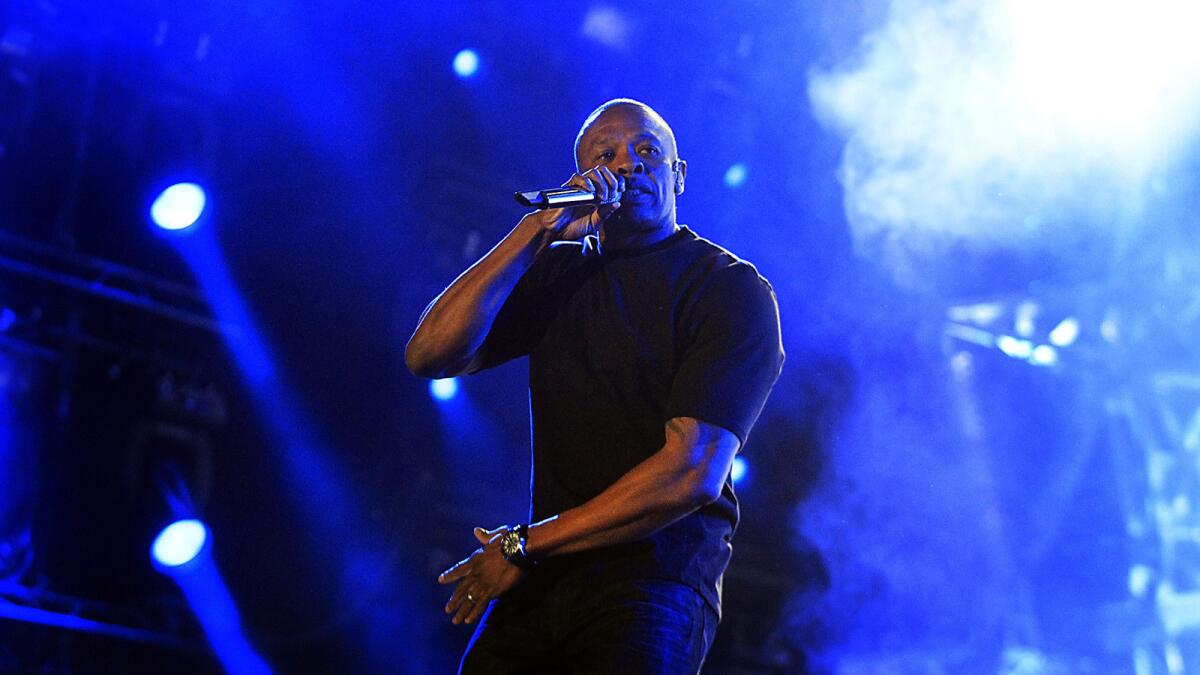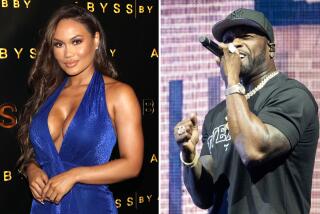Dr. Dre releases statement apologizing to ‘Women I’ve hurt’

Amid a firestorm of controversy that biopic “Straight Outta Compton” ignored the storied instances of alleged violence against women at the hands of N.W.A’s most successful co-founder, Dr. Dre, the rapper-producer-mogul has issued a statement.
While “Straight Outta Compton” opened Aug. 14 to critical acclaim and hit No. 1 at the box office over the weekend by pulling in $56.1 million, the positive debut has been mired in criticism that it overlooked some of the pioneering rap group’s darker hallmarks, specifically N.W.A’s misogynistic lyrics and much more serious, a physical assault by Dre of female hip-hop journalist Denise “Dee” Barnes.
“Twenty-five years ago I was a young man drinking too much and in over my head with no real structure in my life. However, none of this is an excuse for what I did,” Dre said in a statement released to the New York Times on Friday.
FULL COVERAGE: ‘Straight Outta Compton’ and N.W.A’s legacy
“I’ve been married for 19 years and every day I’m working to be a better man for my family, seeking guidance along the way,” his statement continued. “I’m doing everything I can so I never resemble that man again.”
On Tuesday, Gawker published an essay from Barnes regarding the 1991 attack that Dre eventually pleaded no contest to and was given probation. (Barnes settled out of court for an undisclosed amount, with reports that she originally offered to drop the charges if Dre would help her own rap group with its music.)
The incident happened in 1991 during a record release party in Los Angeles. Barnes was the host of Fox’s popular hip-hop show “Pump It Up!” The year prior she had featured Ice Cube, who departed the group over financial disputes, in a segment where he dissed his former group members.
“He picked me up by my hair and my ear and smashed my face and body into the wall,” Barnes said in a July 1991 report in The Times. “Next thing I know, I’m down on the ground and he’s kicking me in the ribs and stamping on my fingers. I ran into the women’s bathroom to hide, but he burst through the door and started bashing me in the back of the head.”
‘Straight Outta Compton’: Photos of N.W.A on film and in real life
Barnes’ run-in with Dre, however, was included in an earlier version of Jonathan Herman’s screenplay for the film.
In the scene, the fictional Dre, “eyes glazed, drunk, with an edge of nastiness, contempt” (as noted in the script) spots Barnes at the party and approaches her.
“Saw that ... you did with Cube. Really had you under his spell, huh? Ate up everything he said. Let him diss us. Sell us out.”
The conversation escalates, Barnes throws her drink in Dre’s face before he attacks her, “flinging her around like a rag-doll, while she screams, cries, begs for him to stop.”
Aside from Barnes, Dre’s ex-girlfriend R&B singer Michel’le has also been vocal about her tumultuous relationship with Dre.
Michel’le, a former N.W.A labelmate, has been frank about her volatile relationships with Dre and Marion “Suge” Knight (she has children with each of them) over the years in interviews and as a cast member on TVOne’s hit docu-series “R&B Divas L.A.” Another one-time signee to Eazy-E’s Ruthless Records, Tairrie B, has also alleged that Dre punched her twice in the face at a Grammys after-party in 1990 after she recorded a diss track.
“Straight Outta Compton” courted controversy throughout its production.
Its casting call went viral – and certainly not for a good reason.
The top choice of women were “the hottest of the hottest” women with “no extensions, very classy looking” and “great bodies”; then “fine girls” who “should be light-skinned. Beyonce is a prototype here.” At the bottom? African American girls who are “poor,” “not in good shape” and “medium to dark skin tone.”
The casting call stirred up a conversation about the group’s misogynist and nihilistic lyrics and the film’s intentions on handling it.
And the fact that the film sidestepped some of the group’s harsh lyrics directed toward women for a narrative that tightly focused on the group rising to fame while pushing back against police brutality – an especially urgent one considering the ongoing national debate over the use of lethal force against blacks by law enforcement – was more complicated in light of the new album from Dre that was partly inspired by “Straight Outta Compton” and his first in 16 years.
‘Straight Outta Compton’ film about N.W.A echoes the past and present
On the track “Loose Cannons,” Dre kills a woman and buries her body in a skit that bookends the song. The album, “Compton: A Soundtrack,” debuted at No. 2 on the Billboard chart.
Apple, which employs Dre as a top consultant after buying his Beats music company for $3 billion and exclusively released his new album, also issued a statement to the New York Times.
“Dre has apologized for the mistakes he’s made in the past and he’s said that he’s not the same person that he was 25 years ago. We believe his sincerity and after working with him for a year and a half, we have every reason to believe that he has changed.”
The mogul ended his statement with an apology “to the women” he’s hurt, without naming anyone specifically.
“I deeply regret what I did and know that it has forever impacted all of our lives,” he said.
For more music news follow me on Twitter: @gerrickkennedy
MORE:
Review: N.W.A film ‘Straight Outta Compton’ starts fast but runs out of gas
‘Straight Outta Compton’: A conversation with director F. Gary Gray
Highlights of The Times’ early coverage of N.W.A
More to Read
The biggest entertainment stories
Get our big stories about Hollywood, film, television, music, arts, culture and more right in your inbox as soon as they publish.
You may occasionally receive promotional content from the Los Angeles Times.







